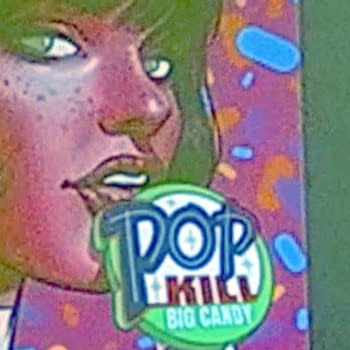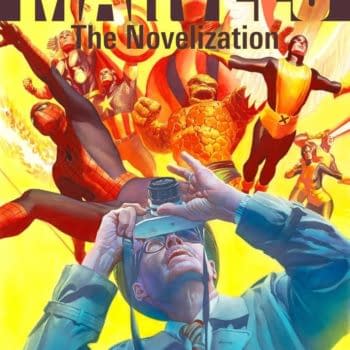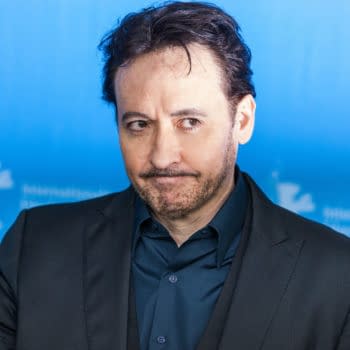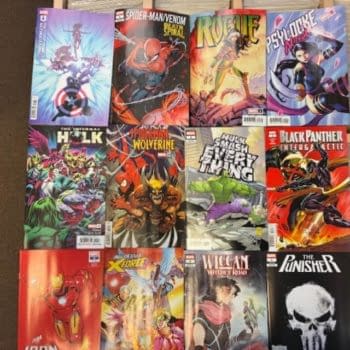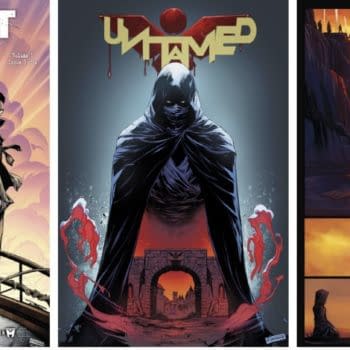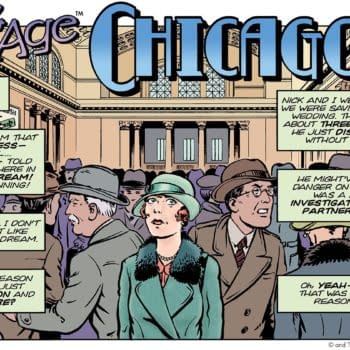Posted in: Comics, Recent Updates | Tagged: Aub Driver, buzzkill, dark horse comics, Donny Cates, Frank Barbiere, Geoff Shaw, Lauren Affe, Mark Reznicek, New York Comic Con 2013
Escape Goat, Space-Bears, And A Troubled Hero in Buzzkill – The Bleeding Cool Interview with Donny Cates and Geoff Shaw
Buzzkill is one of the most interesting recent releases from Dark Horse in a strong slate of new books. It follows the life and times of Ruben, a superhero whose powers only become active when he ingests alcohol, often to the point of blacking out, and he lives in a world where some other heroes have substance-driven powers, too. It's a world of carnivalesque villains, where strange and even stranger things happen, but the book's leaps of imagination are curiously grounded in the rock-bottom state that Ruben experiences again and again.

Hannah Means-Shannon: Well, guys, I love the series already. Though I've only read one issue so far. I read a lot of Dark Horse books but this one I am definitely buying. I want to see this going on a long time. Is there a possibility of more miniseries?
Donny Cates: Another mini? Yeah, it's possible. Look out for some stuff in early '14 or so.
HMS: Did Buzzkill appear previously in Dark Horse Presents or anything?
DC: No. Totally new. We started out writing as a mini. What's funny though is that it was supposed to be called Blackout. But the first time it was called "Blackout" and when we pitched it, we found that Mike [Richardson], the president of the company, and Frank Barbiere, who does Five Ghosts, were actually doing a book called Blackout. That's what got Mike's attention. He was like "What the fuck? You guys are working on this? We can't do that". So actually Aub Driver, and my wife, simultaneously said "Buzzkill", and I was like, "That's fucking awesome".
My first appearance at Dark Horse was in Dark Horse Presents #24, which was also the first issue of Blackout. So after all that, my name ended up in a book called Blackout after all. Our colorist Lauren Adlard is actually the colorist on Five Ghosts, so Frank [Barbiere] and I have this fake rivalry on Twitter. I'm like "You fucking stole my name, you stole my colorist, son of a bitch!"

Geoff Shaw: I've heard a lot of positive feedback from people who have had that problem in their life and they really appreciate that the issue is being actually taken respectfully and handled.
DC: I think if there was ever any kind of negativity or anything, it was when the book was announced at C2E2 last year, because when you hear the premise of it, it does sound like it's going to be this very "guy and his spinach can" kind of romp.
GS: It could be a hard sell. I could see how it could be.
DC: I think that as soon as anyone takes the time to actually read the first issue, they see that that's not what we're interested in doing at all.
HMS: It starts off at an AA meeting…that's good. That's very good, I think.
GS: Right away, yeah, right away.
DC: As far as introducing you to a character, as in "Hi, I am X and I do X", it's clever. You kind of have to do it.

GS: That was actually a lot of fun to draw. Just making you feel for this guy, right off the bat. That was the most fun part for me, that the first issue was that meeting.
DC: Geoff's artwork is so emotional. It's not something that you see a lot in mainstream comics. Not in superhero comics especially. It's what really attracted me to Geoff's art. When I saw his Deviant Art page, he had a bunch of superhero action, but there was this one scene. It was just this couple talking in a diner. And I was like, "That's fucking it. That's the guy. That's gotta be the guy".
GS: It was really good. Acting is one of my favorite things to draw. Just acting. Characters being emotive, you know?
DC: And you're right. When I wrote that script originally, me and Rez [Mark Reznicek], my co-writer on it were like, "Dude, this guy is sitting in a room and talking for like 15 fucking pages".
HMS: And it's like, "Who really cares?"
DC: And I said, "It's going to work. I know it's not normally how you write a comic." But it felt honest to me. If you want your audience to get to know a character, have them sit in a fucking room with him for and hour and fucking talk to him.
GS: Dealing with alcoholism in the first issue is a lot of sitting around talking. You've got two obstacles right away.
HMS: You guys made a difficult road for yourselves by doing that!
DC: [laughs] Issue two, is my "Thank you", to Geoff. I said, "You got me through an entire issue of just nothing but talking, so what do you want to do?" And he was like "Fucking monster fights". And I was like, "Let's get into it!" [laughter]. So issue two is just balls to the walls bloody action.
GS: Every artist…You know, as much as I like drawing acting, in comics you want to draw those big, awesome pictures. Those splash pages…
HMS: Let me get this out. I'm getting this comic out [Taking out issue two and putting it on the table, opening it].
GS: Yeah. In issue two there are a couple of splash images. In this one, there are just so many opportunities. But, I'll show you.
HMS: Because I wanted to know about the rest of the world of Buzzkill.

DC: Bears!
GS: I remember that conversation, too, on the phone. I had just read the script. With the villains, they're so cartoony and outlandish, but he told me there were bears…
DC: So he was like, "So there are bears? Just like "bear" bears??
DC and GS: BEAR-PEOPLE?? Or like bears?
DC: And I said, "No, just bears".
HMS: Bear-people? Ok. That's making my head explode.
DC: Because that's a legitimate question! That was the moment where I fucking love what I do, when I was talking to someone and saying, "No, not bear-people. Bears. Bears". Because you never know! You don't.
HMS: You're breaking my mind. Ok–my God. Here it is [Looking at the comic together]. Look at that scene!
DC: Yeah! Actually, we put in a handy little guide at the back that names all of them, for the afficionado. My favorite is this little guy right here [pointing].
DC: We have a goat. He's a teleporting goat and his name is "Escape Goat". That's right, let that sink in.
GS: But he was very explicit. He wanted, "Just a goat. Don't do anything".
DC: JUST A GOAT.
GS: Unlike the bears, who are different. This is a goat. Just a goat. But he can teleport.
DC: Escape goat. I will say this, Escape Goat is probably the only character that's going to follow through through every other book that I do.
HMS: Every other series you do? Escape Goat is going to be in every book you do? Ok–this is going down in the record.
DC: Absolutely! I love the shit that is Escape Goat. Every fiber, he draws everything together.
HMS: Ok–So you're saying, "Escape Goat will be in every book I do, as long as it's creator-owned"?
DC: Until they tell me to stop!
HMS: Who's "they"? The fans?
DC: Valiant probably, because they already have a goat in their book!
HMS: Actually, I have a thing for goats. I really want a pet goat.
[laughter]
GS: You have to have the right environment for a goat, though. They seem like the worst.
[laughter]

DC: Ruben, personally to me…I lost a friend due to alcoholism right when Rez sent me his idea for this. For me, Buzzkill is entirely me working out my feelings on that, and whereas my friend was actually too stubborn to ask for help, I get to write a fiction where my friend did. And what keeps him going is, at the end of the day, he just genuinely wants to do good. He, in his heart, wants to be a hero, and he's just so burdened by the fact that to do that, he has to be hurting, he has to be not present. And I think that rips him apart.
HMS: Maybe that's why it resonates with readers, because I think a lot of us have had friends and family members who have had problems.
DC: Yeah. I didn't even know this, but Geoff and I have had family who have gone through stuff, too.
GS: Yeah, my brother was in AA meetings, so when I told him I was doing this, he got really excited. He told his wife, "Hey, come here, look! There's an AA meeting!" He was laughing. He just thought it was the coolest thing. I just think you don't see this happening in comics, at all. So, if nothing else, we have the Alcoholics Anonymous community.
DC: I was holding my breath when the reviews were coming in because it meant that I liked it and the fans liked it, but more than that, I'm just so glad that they get it. What we're trying to do. And especially people who have gone through those problems, they get it, and they like it.
That means the world to me. Getting e-mails from people who say, "Thank you for doing this". Because I've lost a lot of people to it. And I went to a bunch of AA meetings to research it. And those guys were amazing. They loved sharing their stories and they are all trying hard to be good people. And it's a disease. There is an absolute level of blame involved, but at the end of the day, it's nothing they can control. It's nothing they ever wished on themselves. So to make that person a villain or a punch-line is just so inherently dishonest to storytelling. Someone who is suffering through a disease.

GS: Ruben as the man or the super hero?
HMS: Both.
GS: As far as Ruben goes, Donny had a kind of rough description of the guy.
DC: Well, haven't you noticed? Look at him [Flipping Geoff's cap up by the brim to look at his face at an angle, pointing out the resemblance to Ruben].
GS: [laughs] I will say, I use myself. Everybody does that. I know my face better than I know anyone else's. So, I'm drawing myself. It's hard not to. It's hard not to put yourself into the main character. Because you're an actor as an artist. So I can see a lot of myself in him. But as far as the superhero goes, that was a pretty organic design process. The idea basically was that this is a "brawler". He's the guy that you would get into a fight with down at a bar.
DC: He's not like a sleuth or anything.
GS: He's not the guy who comes in on a white horse or with a cape, which was an initial suggestion…
HMS: A cape??
DC: Yeah, a cape.
HMS: I'm with Geoff on this one.
DC: And he was absolutely right. He fought with me tooth and nail and he was absolutely right. It wouldn't have worked.
HMS: Just thinking about his angularity and his movement. Well, that's because that's how Geoff draws as well. To see that is actually so important once you get into the book.
DC: And his artwork is so fluid and so moving. There's the hair.
HMS: He's almost statuesque, but not in an old-fashioned way.
DC: He's almost "Ruben-esque". That is the worst joke I've made in the entire time I've been doing this.
HMS: Oh God, you're a punster.
DC: I know, it's horrible. Let me just say that the costume for him is not anything I wrote. I had him in a white body suit with like some gloves. I really didn't hold onto that because this guy [Geoff] is a master designer in everything he does. He was an Imagineer.
GS: I was an Imagineer. I worked at Disney doing Imagineering for about a year. Coming up with concept design and character work related to the theme parks and phone apps.
DC: And who am I to tell him how to fucking design anything?
GS: Well, no, to be fair, I didn't have any pushback because there are so many fucking characters in this book. It's not a small story.
DC: Yes, actually in the four issues, I've counted them and it's over 30 characters.
HMS: Did you all make the color choices?
DC: No, that's Lauren Affe. She's amazing.
GS: She's such an integral part of the storytelling.
HMS: Argh, Sorry, looks like we're running out of time…
GS: Well, the book gets crazy. It gets crazy. By the fourth issue, it gets so big. It made me tear up when I read the script. It's such a well-written script. It hits all the right marks.
DC: Aw, I love him. I love him.
HMS: Thanks for your time and your wild insights, Donny and Geoff.
Hannah Means-Shannon is Senior New York Correspondent at Bleeding Cool, writes and blogs about comics for TRIP CITY and Sequart.org, and is currently working on books about Neil Gaiman and Alan Moore for Sequart. She is @hannahmenzies on Twitter and hannahmenziesblog on WordPress. Find her bio here.











